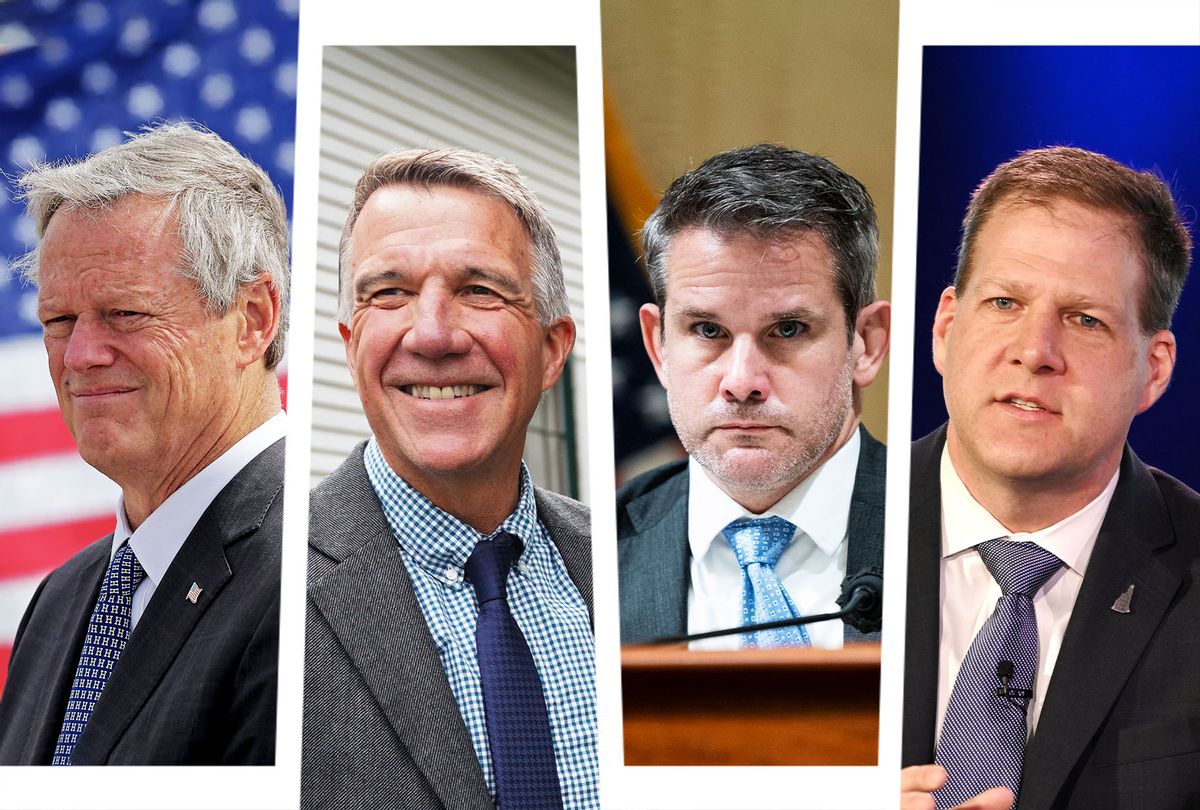Moderate Republicans are declining paths toward higher office, or withdrawing from their positions altogether, as the GOP becomes increasingly essentialized by right-wing extremism following Donald Trump's presidency.
On Wednesday, Massachusetts Gov. Charlie Baker, a two-term governor who is more popular amongst Democrats than Republicans, announced that he will not be running for re-election next year, making the seat especially vulnerable to a Democratic pickup in the deep blue state. Baker, a former healthcare executive, attributed his withdrawal to Massachusetts' ongoing need for pandemic recovery, calling another campaign of his "a distraction."
"We want to focus on recovery, not on the grudge matches political campaigns can devolve into," Baker wrote in a public letter.
As of November, Massachusetts has seen 852,527 confirmed cases and 19,373 deaths, with roughly half of the latter occurring in nursing homes. Baker came under scrutiny for an outbreak at the Holyoke Soldiers' Home in Spring of last year, according to The Boston Globe, which took the lives of 67 veterans. Baker was also harshly criticized this February over his decision to cut off the vaccines for local clinics, instead prioritizing mass vaccination sites.
Meanwhile, other GOP governors such as Chris Sununu of New Hampshire and Phill Scott of Vermont have rebuffed opportunities to pursue U.S. Senate seats.
Early last month, Sununu announced that he would be bowing out of a potential Senate bid in the midterms, effectively securing another term for incumbent Sen. Maggie Hassan, D-N.H.
"My responsibility is not to the gridlock and politics of Washington," Sununu told reporters. "It is to the citizens of New Hampshire. I'd rather push myself 120 miles an hour delivering wins for New Hampshire than just slow down and end up on Capitol Hill debating partisan politics without results."
RELATED: "Recruiting failure": N.H. Gov. Chris Sununu bails on 2022 Senate race; Republicans mad
His withdrawal – an about-face after months of promises and hype – reportedly shocked and angered many Republicans who considered him the party's best shot against Hassan. According to POLITICO, and The Hill, some GOP strategists considered Sununu's withdrawal a "recruiting failure" on part of the GOP, whose conduct and rhetoric has in recent years apparently alienated its more centrist members.
Want a daily wrap-up of all the news and commentary Salon has to offer? Subscribe to our morning newsletter, Crash Course.
Just days after Sununu's decision, Scott officially announced a similar course of action, echoing a long-held promise that he would not run for Senate in 2022, despite the vacancy offered up by the resignation of Sen. Patrick Leahy, D-Vt. A spokesperson for the governor said last month that Scott "has been clear that he is not running for the U.S. Senate next year. That has not changed."
According to Morning Consult, Republican strategists have for the past year been eager to lure Scott into a Senate bid, largely due to his overwhelming popularity. A poll from June to October found that Scott had a whopping 79% approval rating in his state. The Washington Examiner notes that Scott "was seen not just as [sic] Republican's strongest possible Senate candidate, but perhaps the only Republican who could even in theory win the seat."
Aside from governors, Republicans in Congress have also made moves to distance themselves from the party.
RELATED: Republican Rep. Adam Kinzinger, vocal Trump critic, says he won't run for re-election
Back in October, Rep. Adam Kinzinger, R-Ill., revealed that he would not be running for re-election next year. Kinzinger, a six-term congressman and no doubt one the fiercest anti-Trump Republicans, said in a video at the time that "it's become increasingly obvious to me that in order to break the narrative, I cannot focus on both a reelection to Congress and a broader fight nationwide."
Meanwhile, in the Senate, moderate Republicans like Sens. Richard Burr, R-N.C., Pat Toomey, R-Pa., and Rob Portman have all announced that they will not be seeking another term.



Shares